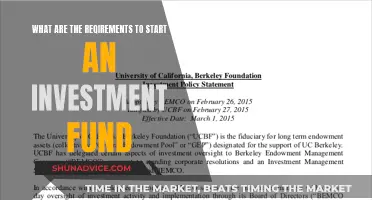
When investing in certain complex and risky products, such as the Fidelity® Wise Origin® Bitcoin Fund (FBTC) and the Fidelity® Ethereum Fund (FETH), investors are required to execute Fidelity's Designated Investments Agreement (DIA). This agreement is a one-time process that outlines the risks and qualification requirements associated with these investments. It ensures that investors are sophisticated, experienced, and capable of independently analyzing the risks of investing in designated investments. By signing the DIA, investors agree that they have a high-risk tolerance and are not relying on Fidelity for advice or recommendations regarding these complex and risky products.
| Characteristics | Values |
|---|---|
| Fidelity's Designated Investments Agreement (DIA) | Required for certain complex and risky products |
| Only required to be signed once | |
| When to sign the DIA | Before placing an initial trade for the Fidelity® Wise Origin® Bitcoin Fund (FBTC) |
| After entering initial order details and clicking "Preview Order" | |
| Investment objective | Must be "Most Aggressive" |
| Who the DIA is for | Self-directed, sophisticated, experienced investors |
| Investors with a high-risk tolerance |
What You'll Learn

The agreement is required for certain complex and risky products
The Designated Investments Agreement (DIA) is a mandatory agreement that investors must sign when trading in certain complex and risky products. This agreement outlines the risks and qualification requirements associated with these investments. It is a one-time agreement that investors must accept before making an initial trade for the Fidelity Wise Origin Bitcoin Fund (FBTC) or similar spot crypto ETP products.
The DIA is required for products that are considered complex and risky, such as the FBTC and Fidelity Ethereum Fund (FETH). These funds provide investors with exposure to the price of bitcoin and ether, respectively, without directly purchasing the cryptocurrencies themselves. While they offer an easier path to crypto investing, these funds are highly volatile and could result in significant losses for investors.
By signing the DIA, investors acknowledge that they understand the risks associated with these complex and risky products. They confirm that they are sophisticated and experienced investors with a high-risk tolerance and the financial resources to sustain potential losses. Additionally, investors agree to educate themselves about the investments, independently analyze the risks, and make their own investment decisions.
The DIA also clarifies that Fidelity does not recommend or solicit the purchase of designated investments. Investors should not rely on any communications with Fidelity representatives as recommendations or solicitations. Instead, investors are expected to conduct their own research and due diligence before investing in these complex and risky products.
Angel Broking: Your Mutual Fund Investment Guide
You may want to see also

It is a one-time agreement for subsequent trades
When investing in certain complex and risky products, such as the Fidelity® Wise Origin® Bitcoin Fund (FBTC) and similar spot crypto ETP products, investors are required to execute Fidelity's Designated Investments Agreement (DIA). This is a one-time agreement for subsequent trades of this security or other designated investments.
The DIA is a mandatory agreement that outlines the risks and qualification requirements associated with investing in complex and risky products. It is designed to protect investors and ensure they understand the nature and risks of their investments. By signing the DIA, investors confirm that they are sophisticated and experienced investors with a high-risk tolerance and the capacity to sustain potential losses.
To complete the DIA, investors must follow specific steps to place an initial trade for the FBTC before setting up recurring investments. After entering the initial order details and clicking "Preview Order," investors will be prompted to review the agreement and update their investment objective. The DIA requires investors to acknowledge that they are responsible for educating themselves about the investments they make and understanding the associated benefits and risks.
It's important to note that the DIA only needs to be executed once. If an investor has previously executed the DIA, they do not need to complete it again for subsequent trades of the same security or other designated investments. This one-time agreement simplifies the investment process and ensures that investors are protected while making informed investment decisions.
Index Funds: Smart Low-Cost Investment Strategy?
You may want to see also

It is for self-directed, sophisticated, and experienced investors
Fidelity's Designated Investment Agreement (DIA) is a requirement for investors who want to execute certain complex and risky products. It is designed for self-directed, sophisticated, and experienced investors who conduct their own investment research and analysis. These investors do not rely on Fidelity for advice, information, or direction related to these investments. Here are some key points that highlight why the DIA is targeted towards self-directed, sophisticated, and experienced investors:
- Sophisticated and Experienced Investors: The DIA states that investors must represent themselves as sophisticated and experienced. This indicates a level of investment knowledge and expertise that not all investors possess. These investors are expected to have a high-risk tolerance and understand that they could lose some or all of their investment, as stated in the agreement.
- Self-Directed Nature: By signing the DIA, investors agree that they are responsible for educating themselves about the investments they make. They commit to independently analyzing the risks of designated investments and making their own investment decisions. This self-directed nature of the agreement assumes a certain level of investment sophistication and experience.
- No Reliance on Fidelity for Advice: Investors who sign the DIA acknowledge that they are not relying on Fidelity or its representatives for advice, information, or recommendations regarding designated investments. This includes not relying on any communications with Fidelity representatives as recommendations or solicitations. This clause further emphasizes the expectation that investors are self-directed and do not need guidance from Fidelity.
- Understanding of Risk: The DIA requires investors to understand and accept the risks associated with designated investments. By signing the agreement, investors confirm that they have reviewed and understood the benefits and risks of each investment. This demonstrates a sophisticated and experienced approach to investing, where investors are aware of the potential downsides and are prepared to take on those risks.
- Investment Research and Analysis: The DIA mentions that self-directed, sophisticated, and experienced investors conduct their own investment research and analysis. This implies that these investors have the knowledge and skills to evaluate investments independently, without relying solely on Fidelity's tools or resources.
- Ability to Sustain Losses: As part of the DIA, investors agree that they can afford to lose some or all of their investment in a designated investment. This acknowledgment demonstrates a level of financial sophistication and stability that is characteristic of experienced investors.
In summary, the Fidelity Designated Investment Agreement is specifically designed for self-directed, sophisticated, and experienced investors. These investors are expected to have a high-risk tolerance, conduct their own research, and make investment decisions independently. By signing the DIA, investors agree to take full responsibility for their investment choices and understand the potential risks involved.
Choosing the Right Mutual Fund: A Comprehensive Guide
You may want to see also

It is for investors with a high-risk tolerance
Fidelity's Designated Investment Agreement (DIA) is a requirement for investors with a high-risk tolerance. This agreement is necessary for certain complex and risky products, such as the Fidelity® Wise Origin® Bitcoin Fund (FBTC) and similar spot crypto ETP products. These products are highly volatile and could result in investors losing their entire investment.
The DIA is a one-time agreement that investors must accept before making their initial trade for risky products. It is designed to ensure that investors are aware of the risks involved and have a high-risk tolerance. By agreeing to the DIA, investors confirm that they are sophisticated and experienced investors with a high-risk tolerance and sufficient resources to sustain potential losses. They also acknowledge that they are responsible for educating themselves about the investments and will not rely on Fidelity for advice or recommendations.
The DIA is a crucial step in the investment process for high-risk products, as it helps to safeguard investors and ensure they understand the potential risks and complexities involved. It is important for investors to carefully consider their risk tolerance and financial situation before agreeing to the DIA and investing in these risky products.
Additionally, Fidelity requires the investment objective of the account that will hold the shares of a spot crypto ETP to be set to "Most Aggressive." This further emphasizes the high-risk nature of these investments and ensures that investors are aware of the potential risks involved.
Invest IRA Funds: A Step-by-Step Guide to Success
You may want to see also

It is not a recommendation or endorsement from Fidelity
When investing in certain complex and risky products, such as the Fidelity® Wise Origin® Bitcoin Fund (FBTC) and similar spot crypto ETP products, investors are required to execute Fidelity's Designated Investments Agreement (DIA). This agreement is a mandatory requirement and serves as a form of investor protection. It is important to emphasise that this is not a recommendation or endorsement from Fidelity.
The DIA outlines the risks and qualification requirements associated with investing in these designated investments. It is designed for self-directed, sophisticated, and experienced investors who conduct their own investment research and analysis. By signing the agreement, investors acknowledge that they have a high-risk tolerance and are capable of sustaining potential losses.
Fidelity explicitly states that it does not recommend or endorse the purchase of designated investments. The company clarifies that investors should not rely on any communications with Fidelity representatives as recommendations or solicitations. Instead, investors are expected to make their own investment decisions and conduct their own analysis of the risks involved.
Furthermore, investors are responsible for educating themselves about the investments they make, including reading the applicable offering documents, prospectuses, and disclosures provided by Fidelity. This ensures that investors are aware of the investment objectives, unique features, risks, fees, and expenses associated with these complex financial products.
In summary, while the DIA is a necessary step to access certain investment opportunities through Fidelity, it is not an endorsement or recommendation from the company. Investors are expected to conduct their own due diligence, assess their risk tolerance, and make informed investment decisions independently.
Fidelity Investments: EFT Fees and You
You may want to see also
Frequently asked questions
Fidelity requires customers to sign a designated investment agreement (DIA) when dealing with certain complex and risky products.
The designated investment agreement is a contract that outlines the risks and qualification requirements associated with investing in complex and high-risk products.
These investments are typically very volatile and can become illiquid at any time. They are also more susceptible to market manipulation than securities.
Some examples include the Fidelity Wise Origin Bitcoin Fund and the Fidelity Ethereum Fund, which are both spot crypto ETPs.
After entering your initial order details and clicking "Preview Order," you will be prompted with steps to review the agreement and update your investment objective.







